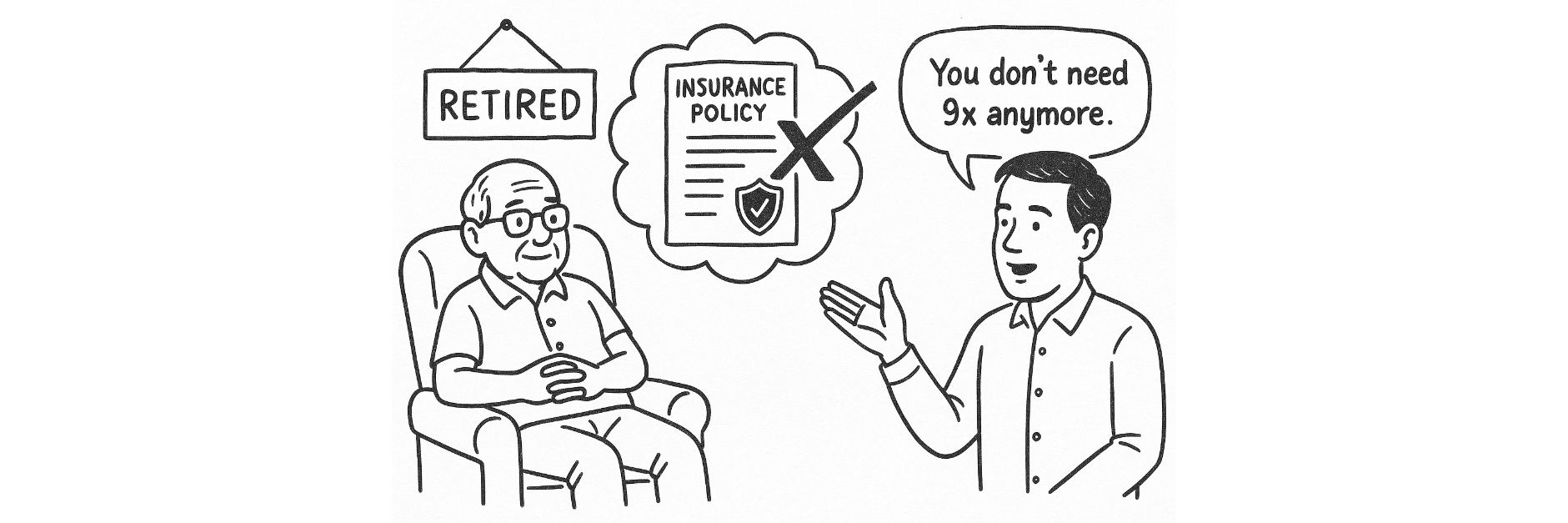Why You Might Not Need 9x Your Income in Life Insurance After Retirement
I met with a client recently who wanted to discuss about investment solutions. For all our clients, we always start our discussions by understanding how well our clients are protected, before we talk about wealth accumulation. He sat across from me, past 65, retired, and living comfortably from his savings and CPF payouts.
He asked me a question I’ve heard many times.
“Do I still need all this? I read somewhere I should have nine times my income in death coverage.”
It’s a common guideline. In Singapore, MAS and the Life Insurance Association have long suggested that a person should aim for about 9 to 10 times their annual income in life insurance coverage. The rationale is straightforward. In the event of premature death, this lump sum could help the family maintain their lifestyle, pay off debts, and provide for dependants.
But here’s the thing.
That guideline is built on a certain life stage. Having 9x death coverage makes a lot of sense if you’re in your 30s, 40s, or even early 50s, and your children are young, your mortgage is sizeable, and your income is the backbone of your household.
But my client wasn’t in that life stage anymore.
His children were already working and supporting themselves. His mortgage had been fully paid off. He had no major debts. In short, there was no longer anyone relying on his income, because he had no active income to replace.
So I told him what he didn’t expect to hear:
“You don’t need 9x anymore. In fact, you might not need much at all.”
Every week, I’ll be sharing practical tips and invaluable knowledge to guide you on your path to financial independence.
When Does the 9x Rule Stop Applying?
The moment you retire, your financial responsibilities change.
Here are a few signs that you may not need high death coverage anymore:
- Your children are financially independent
- You have no dependants relying on your income
- Your mortgage and major liabilities are fully paid
- You’ve accumulated sufficient assets and savings to cover your own needs
At this point, the original purpose of life insurance being an income replacement becomes irrelevant.
What Should You Focus on Instead?
For my client, the better question wasn’t how much life coverage he needed, but rather what protection he still needed at this stage of life.
We shifted the focus to these areas:
1. Critical Illness Coverage
A major illness like cancer or stroke can derail retirement plans quickly. We reviewed whether he still had sufficient lump sum coverage to handle such a scenario.
2. Hospitalisation and Surgical Coverage
We made sure his hospitalisation plan was active and still adequate. At this age, even a few days in a private hospital can cost thousands.
3. Long-Term Care Planning
We discussed whether plans like ElderShield or CareShield Life were in place, and if there was a need to enhance them for future caregiving costs.
4. Legacy Planning
Rather than using insurance purely for protection, some policies could be repurposed for estate planning. In his case, however, the need was minimal as his children were well-settled.
The Cost of Being Over-Insured
When I explained this to him, he blinked and said,
“Wah, then I’ve been over-insured for years.”
He wasn’t alone. Many people continue paying premiums on policies they no longer need either out of habit, fear, or simply not knowing better. These premiums could have been redirected to better uses, like investing, charitable giving, or just enjoying retirement.
Insurance Needs to Evolve With You
Your life changes. Your insurance portfolio should too.
What protected you in your 40s may no longer be relevant in your 60s. That’s why regular reviews are important, not just to add new policies, but sometimes, to let go of the old ones.
If you’re in your 60s or beyond, and you’ve not reviewed your insurance in the last few years, now is a good time to do so. You might find that you’re already more prepared than you think, and carrying less insurance can sometimes be the smarter move.
Need a second opinion?
If you’re not sure what to keep and what to cancel, or want help understanding what your policies actually do, reach out. I’ll help you make sense of it all, without the pressure to buy anything new.

